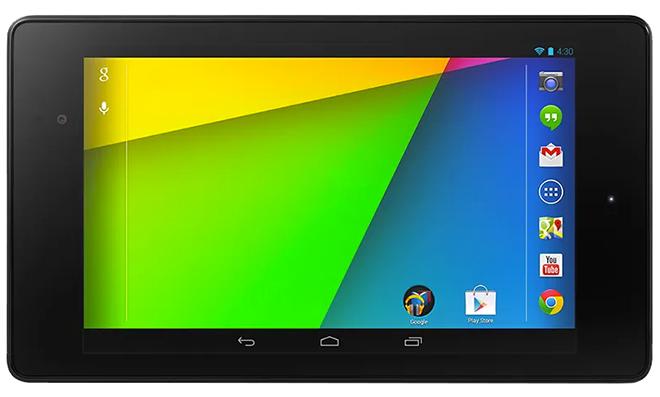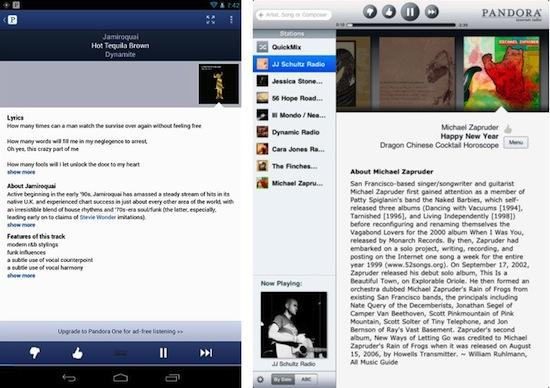Market research group Canalys offered a scathing appraisal of the apps currently available for Android tablet users, stating that "building high-quality app experiences for Android tablets has not been among many developers’ top priorities to date."

The report contrasted the library of "over 375,000" iPad-optimized titles in Apple's App Store against "the low tens of thousands available through Google Play," but focused on just the top one hundred most popular iPad apps: 50 free and 50 paid.
Out of the top 100 popular iPad titles, Canalys reported 30 were missing entirely from Google Play. That includes Apple's chart topping Pages, Keynote, Numbers, iMovie, GarageBand and iPhoto, which are all paid titles exclusive to iPad, as well as Apple's free Podcasts, iBooks and iTunes U for iPad.
Optimized ever so slightly
The group counted another 18 apps as only existing as stretched smartphone apps on Android, designed to fill a tablet's display but not taking special advantage of it.
However, Canalys did include apps like Pandora in its optimized list, in contrast with a recent report by Jared Newman for Time, which cited Pandora's app along with popular titles including Twitter, Facebook, Dropbox as being "the worst offenders" at failing to take any advantage of the additional real estate on tablets, and just "stretching out their interfaces instead of filling the screen with sidebars and menus."

Tablet optimized? Android vs iPad versions of Pandora. Source: Time
Canalys listed all of those apps as being "optimized" for Android tablets, despite actually not being very much more than a smartphone app with a few tweaks. The company did note that its criteria for counting 52 "optimized" Android apps only specified apps that were "optimized (if only a little) for tablet use."
At the launch of iPad 4 and iPad mini last October, Apple's head of product marketing Phil Schiller drew special attention to the "night and day" difference between tablet-optimized iPad apps and the stretched smartphone apps that work on Android tablets (below).

Tablet optimized: Android vs iPad versions of TripAdvisor
Of its generously counted Android-optimized titles, Canalys said six paid apps for iPad are only available as free, ad-supported version on Android. And that wasn't described as a being a compliment.Android's "ad-supported offerings typically deliver a poorer and often more limited user experience, sometimes taking a considerable toll on device battery life and often subjecting users to unskippable videos or other unpopular intrusions." - Canalys
"While nominally free," Canalys Analyst Daniel Matte wrote, "set against a paid version of the app, ad-supported offerings typically deliver a poorer and often more limited user experience, sometimes taking a considerable toll on device battery life and often subjecting users to unskippable videos or other unpopular intrusions."
Facebook for Android, for example, was recently called out by Symantec for "leaking" Android users' information.
"The first time you launch the Facebook application," the security firm stated, "even before logging in, your phone number will be sent over the Internet to Facebook servers. You do not need to provide your phone number, log in, initiate a specific action, or even need a Facebook account for this to happen."
Perhaps the market is driving backwards
It's no secret that Android tablets lack the variety and depth of software available for Apple's iPad. David Pierce, reviewing Google's Nexus for The Verge, wrote that, "the Android app situation has improved a lot, but it's still squarely in the iPad's rearview mirror. From Paper to Clear to Badland, it's no contest."
It's less clear why Android is still so far behind the iPad in apps. Samsung rushed out millions of Galaxy Tab shipments just eight months after the iPad in 2010, and the world was duly informed by Strategy Analytics that Apple's market share in tablets had immediately dropped by 20 percentage points.
Google followed up a few months later with Android 3.0 Honeycomb, unleashing an "avalanche" of Android tablets before the iPad was even a year old.
And yet, three and a half years later, even as Strategy Analytics reports that Android tablets now ship in volumes over twice as large (and due to its retroactive accounting revisions, that Android has been leading the tablet market since at least the spring of 2012), Android's tablet apps are still "still squarely in the iPad's rearview mirror."
Android tablets in the rear view mirror online, too
While not driving optimized tablet app development, the mysterious White Box/Dark Matter nature of Android tablets are also failing to show up online.
Their invisibility is particularly apparent in web statistics, where Android phones do show up roughly equal to iPhones. Android tablets, however, don't really show up at all, even though iPad's 34.28 percent share (in June) makes a larger impression than the iPhone's 22.48 percent.
Speaking at the Wall Street Journal All Things D conference this spring, Apple's chief executive Tim Cook noted, "Last Black Friday IBM did a special study on ecommerce in the U.S. and they looked at every mobile device and what was bought off of those. […] the study said that there were twice as many ecommerce transactions on iPad than all Android devices combined. Not Android tablets, all Android tablets plus phones. It’s incredible.â€"So if there are lots of other tablets selling, I don't know what they are being used for, because that's a pretty basic function: web browsing." - Tim Cook
Citing Chitika's figures, Cook also noted in the company's most recent conference call, "iPad web share data shows that through the quarter we accelerated further and are now… iPad accounts for 84% of the web traffic from tablet, which is absolutely incredible. So if there are lots of other tablets selling, I don't know what they are being used for, because that's a pretty basic function: web browsing."
Conversely, when Google's head of Android Sundar Pichai introduced the company's new Nexus 7 last month, he had to reference a sales study that is known to be flawed in order to claim that the company's tablet had even temporarily outsold the iPad mini in Japan.
A representative of IDC, certainly not conservative in its estimates of Android sales, stated, "we count the Nexus 7 as part of Asus' shipments, and looking at our Japan numbers for 4Q12 (which represents shipments into the channel) Apple shipped about 773K iPad units versus about 350K Nexus 7 units for Asus."
Source: InfoWorld
The best explanation for the dearth of Android tablet apps and the excessive numbers of Android tablet shipments that don't show up anywhere other than market share reports may be the flaws Symantec discovered in Android's random number generator.